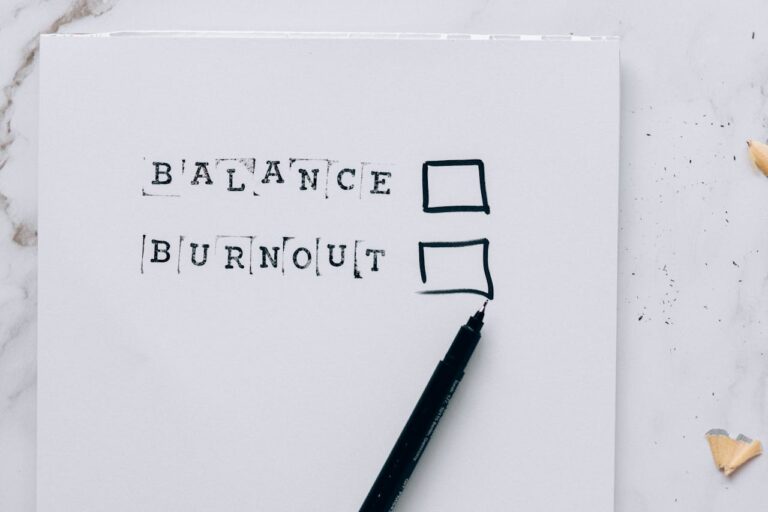Write Us: hello@ali5.org
Work-Life Balance: Why It Matters More Than Ever
Struggling to balance your job and personal life? Discover why work-life balance matters more than ever in 2025, and how to protect your time, health, and happiness, without quitting your job.

Let’s Be Honest, Burnout Is Real
Work-life balance isn’t a “nice-to-have” anymore. It’s survival. Whether you’re working remotely, juggling freelancing gigs, or stuck in a 9-to-5 grind, that constant pressure to always be available? It’s exhausting. And it’s not just in your head; studies show chronic overwork leads to stress, fatigue, and long-term health issues.
But here’s the catch: hustling nonstop doesn’t automatically lead to success. It often backfires. You get more done when you’re well-rested, focused, and actually enjoying your life outside of work. That’s why people and companies are starting to take work-life balance seriously in 2025.
What Really Is Work-Life Balance?
It’s not about working less or avoiding responsibility. It’s about boundaries. It’s being able to shut your laptop without guilt. It’s not replying to work emails at midnight. It’s making time for things that recharge you—family, hobbies, rest, or even just sitting in silence for 10 minutes.
Work-life balance looks different for everyone. For some, it means flexible hours. For others, it’s no work on weekends, ever. The point is: you choose, not your job.
Why It Matters More Than Ever
1. Mental Health Is a Priority (Finally)
The pandemic cracked open a conversation that had been simmering for years: work shouldn’t come at the cost of your mental health. Anxiety, depression, and burnout spiked globally, and no, yoga and a gratitude journal weren’t enough to fix it.
People realized: if your job makes you miserable all the time, it’s not worth it. This shift pushed companies to start offering mental health days, counseling support, and more flexibility. Still, you’ve got to advocate for your own peace.
2. We’re Not Robots
We weren’t designed to sit in front of screens for 10 hours a day. When you’re constantly working, your creativity tanks. Your energy dips. You lose focus. Taking breaks, real ones, actually boosts productivity. So, stepping away from your desk isn’t slacking, it’s smart.
3. Personal Life Isn’t “Extra”, It’s Essential
Relationships, hobbies, health, they’re not bonuses. They’re your life. And when work eats into everything else, resentment builds fast. Balance means having time for what matters to you, not just what your boss wants.
What Happens When There’s No Balance?
Let’s call it out:
-
Burnout: Emotional exhaustion, irritability, brain fog. You feel like you’ve hit a wall, and no amount of caffeine helps.
-
Health Issues: High blood pressure, poor sleep, weight gain or loss, and even heart problems.
-
Relationship Strain: When you’re always “on,” you’re never really present with family or friends.
-
Job Dissatisfaction: You start to hate the thing you once liked because it has taken over your life.
Balance isn’t selfish. It’s how you sustain a career, not escape it.
What Balance Looks Like in 2025
Let’s be clear: remote work didn’t solve everything. In fact, for many, it blurred boundaries even more. But we’ve also seen real progress:
-
4-Day Workweeks: More companies are testing them, and guess what? Productivity goes up.
-
Asynchronous Work: Not everyone has to be online at the same time. It reduces stress and gives people more control.
-
Mental Health Support: Access to therapy, burnout prevention programs, and actual time off.
If your workplace still treats burnout like a badge of honor, that’s a red flag.
How to Create Balance, Even If Your Job’s Demanding
You might not be able to quit or change your schedule overnight. But you can start setting better boundaries.
1. Set Hard Stop Times
Decide when you’re done for the day, and stick to it. No, “just one more email.” If you wouldn’t expect someone to reply at 11 PM, don’t hold yourself to that standard either.
2. Use Your Time Off
Don’t hoard vacation days like they’re gold. Use them. Your body and brain need rest. You shouldn’t have to earn it by nearly burning out first.
3. Create Physical Boundaries
If you work from home, this is crucial. A dedicated workspace, even if it’s just a corner, helps separate “work mode” from “home mode.”
4. Learn to Say No
You can’t do everything. Protect your time. Decline unnecessary meetings. Don’t take on more just to prove yourself.
5. Make Time for Joy
Seriously, schedule it if you have to. Whether it’s painting, baking, working out, or watching trashy TV guilt-free, do more of what fills you up.
For Employers: Your People Aren’t Machines
If you’re a manager or run a team, understand this: happy employees stay longer, perform better, and bring more to the table. Creating a culture that values balance isn’t just kind, it’s smart business.
Simple ways to do that?
-
Respect boundaries: no guilt for logging off on time.
-
Model balance yourself: don’t send emails at midnight.
-
Ask for feedback: what’s working and what’s not?
When employees feel respected and trusted, everyone wins.
Final Thoughts: You Get One Life
Work will always be part of life, but it shouldn’t be your life. Not in 2025. Not with everything we’ve learned. You don’t need to earn rest. You don’t need to explain why you want time for yourself. And you’re not lazy for wanting weekends that feel like weekends.
Balance won’t always be perfect. Some weeks will still feel chaotic. But chasing a more balanced life is worth it. Because at the end of the day, success without peace isn’t success at all.







